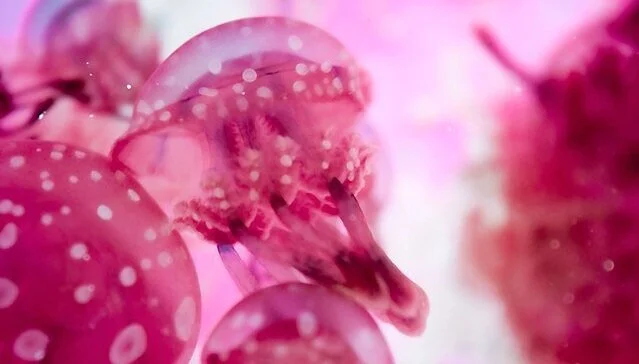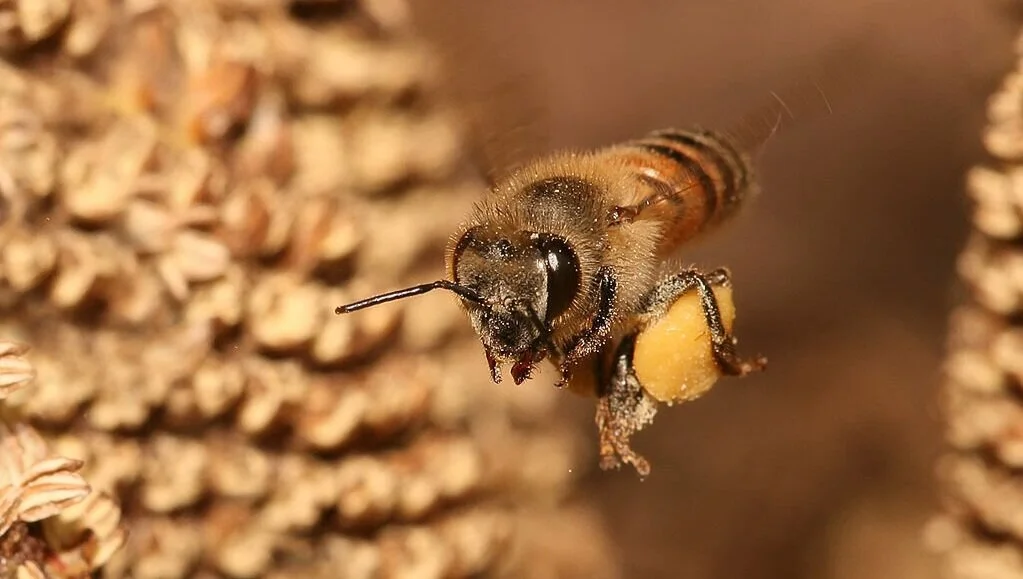The Professor Bringing Her Love of Jellies to the Masses
Could you ever imagine a waterproof jellyfish? Rebecca Helm couldn’t either—until she witnessed it for herself. While studying by-the-wind-sailors, or Velella velella, a type of hydrozoa in the polyp stage of its life cycle, Helm was shocked to see these jellies could live with half of their body below water and the other half above, where they can be seen repelling water.
A fascinating slice of oceanic life known by very few, a discovery of this kind might have been buried somewhere deep in a scientific journal a few decades ago. Today, however, social media has created a space for exciting finds like this to be shared with thousands of people across the world—and Helm has devoted herself to doing just that.
Working as an Assistant Professor of Biology at the University of North Carolina Asheville, Helm studies evolutionary science and, more specifically, the incredibly diverse life cycles of jellyfish. Having amassed more than 77,000 followers on Twitter, Helm has created an online space where anyone can follow the fascinating discoveries made in our oceans, sharing in Helm’s delight over many beautiful creatures as she regularly posts images and information about both well-known species and newly discovered animals.
By harnessing social media to engage in effective and exciting science communication, Helm offers other scientists a model of how they might promote both an interest in the sciences and a love for our planet outside of scholarly publishing models. In 2016, Vox polled 270 scientists, mainly from the biomedical and social sciences, asking them to identify the main problems facing science. One of the key problems these scientists expressed was the inefficient way science is broadcast to the public.
Many scientists wished for better avenues for sharing scientific knowledge with the general public than peer-reviewed articles, which are often kept behind paywalls. More recently, worries over the increasingly obscure nature of scientific academic writing and its level of impenetrability have arisen.
Journalism often steps in to fill these communication gaps, but science reporting is sometimes published with headlines that exaggerate claims or articulate research in a misleading way. On these frustrations with journalism, Helm says, “I think that news moves so fast and science in comparison moves so slowly. Science takes years to do, and in that time, you can have 10,000 articles written about something that turns out to be untrue.”
In her own line of research, Helm contends with the popular—and misleading—idea that jellyfish are “taking over the oceans.” “[There’s this idea that jellyfish are] bad, they’re terrible and they’re going to destroy everything, and it’s just not true,” Helm says. “We’ve done a decade of research now, and all the jelly biologists that I talk to say ‘it’s complicated!’
“Some jellyfish in some places might do well, but a lot of jellyfish around the world are also going to suffer under climate change. But sometimes it already feels too late—there’s already this bad reputation that you struggle to try and fix.”
This feeling, however, has yet to dampen Helm’s enthusiasm. When asked if she believes public output has the potential to minimize the gap between scientific research and the general population, she says, “I certainly hope so. I think stuff like social media and podcasts make it possible for scientists to interact directly with interested people. Thirty years ago, it was just scientists writing in magazines or [being] interviewed in the news. The fact that someone can ask me a question about my research right now is really cool.”
Velella on a Northern California Beach, April 2020 by Zhengan (Wikimedia Commons | CC BY-SA 4.0)
Public interaction with scientists has the potential to foster a sincere love and admiration for our planet and the constant wonder it offers us. In 2021, our climate crisis has become unavoidable: Reports show that the acidity of the ocean’s surface has risen by 30 percent; we may have found ourselves in the midst of the Earth’s sixth mass extinction event as a result of human activities; and extreme weather conditions created by climate change are putting lives at risk.
If we are to save our planet, we must nurture a respect for it—and Helm’s work exemplifies the potential benefit of scientific research to foster such appreciation. She regularly amazes people with the beauty and eccentricity of the creatures that inhabit our planet, reminding us that even those animals you don’t like are an essential feature of the ecosystem.
Jellyfish, Helm’s main fascination, are one of those creatures we might not like yet which remain essential. “They’re a food commodity in several Eastern Asian countries. In addition, jellyfish create habitats for many other animals—other animals hide under or live on top of jellyfish, or maybe they just travel close to jellyfish in case they’re being chased by a larger animal so they can hide behind their jellyfish shield, and a variety of these animals are ones we want to protect,” she explains. “For example, leatherback turtles eat jellyfish almost exclusively. You can’t protect the leatherback without also protecting the jellyfish.”
We can’t pick and choose which members of the animal kingdom we want to preserve. We must fight for them all, and having figures like Helm who are openly enthusiastic about even the ugliest of creatures can help remind us of this.
When speaking about jellyfish, Helm’s fascination with them is infectious. Discussing the excitement she experiences during her own research, she says, “I think the thing that’s been most surprising to me was how many times jellyfish have evolved new life cycles. There’s the average life cycle for a jellyfish, which is a jellyfish. But then you have a planula larva and a polyp and then it [also] produces more jellies. But then the number of times that a species has just thrown that concept out of the window and decided to do something completely different is remarkable. Their biological flexibility is just amazing. Even though I sometimes struggle to explain how complex life is, I think it’s so important, and jellyfish are such a great example of how complicated it can be.’
I, for one, sincerely hope that Helm will continue sharing with us her knowledge and passion for underwater worlds, inspiring us to keep fighting for our beloved planet.
Rebecca Helm is currently researching By-the-wind-sailors and Blue Buttons and more about her and her work can be found here.
Image credit: Small jellyfish found in the foreshore of a beach located in Bantayan (Wikimedia Commons | CC BY-SA 4.0)





